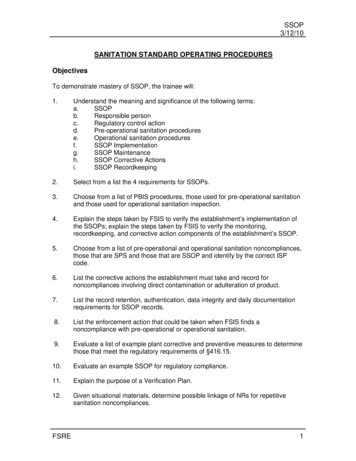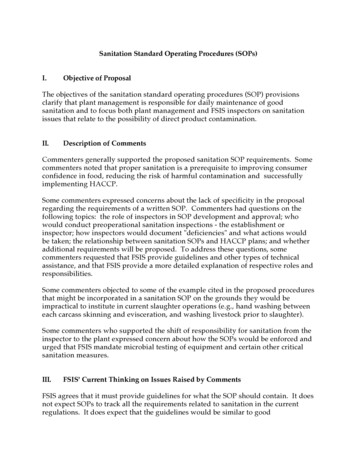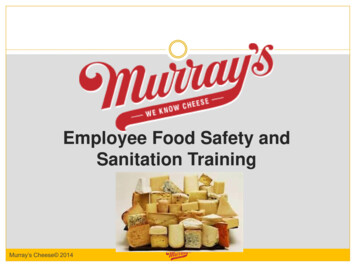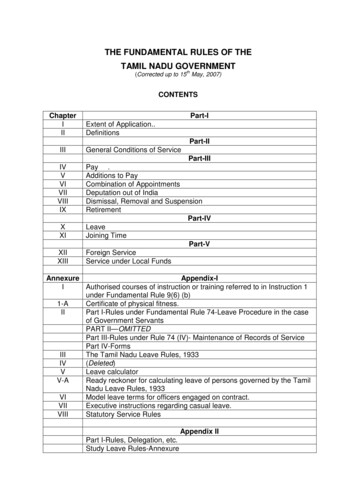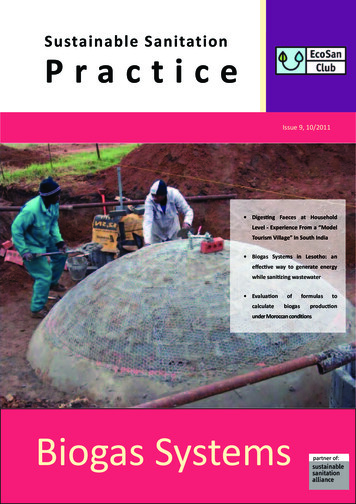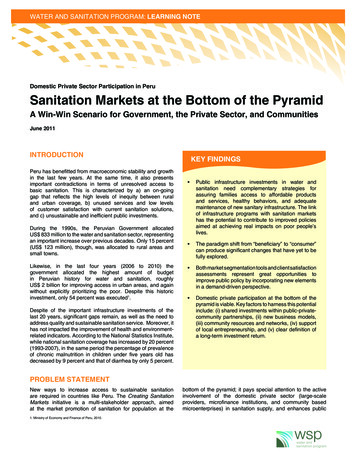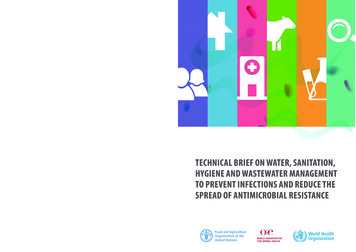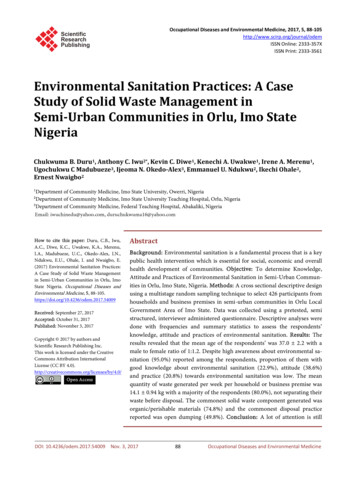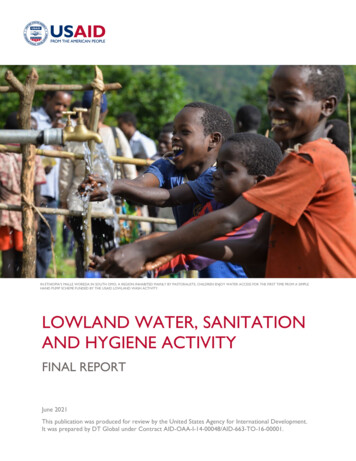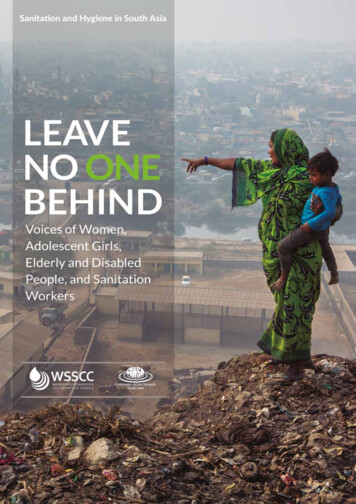
Transcription
SANITATION AND HYGIENE IN SOUTH ASIALEAVENO ONEBEHINDVoices of Women,Adolescent Girls,Elderly and DisabledPeople, and SanitationWorkersFRESHWATER ACTIONNETWORK SOUTH ASIA&WATER SUPPLY AND SANITATIONCOLLABORATIVE COUNCIL
Voices of Women, Adolescent Girls, Elderly and Disabled People, and Sanitation WorkersLEAVENO ONEBEHIND5TABLE OFCONTENTS7FOREWORD8EXECUTIVE SUMMARY13BACKGROUND17WOMEN AND ADOLESCENT GIRLS21ELDERLY AND DISABLED PEOPLE25SANITATION WORKERS AND WASTE COLLECTORS29THE INVISIBLE AND UNHEARD:TRANSGENDER COMMUNITIES, PLANTATION WORKERS AND FISHERFOLK32KEY DEMANDS34RECOMMENDATIONSANNEXES36LIST OF CONSULTATIONS38LIST OF PARTNER ORGANIZATIONS
6FANSA & WSSCCVoices of Women, Adolescent Girls, Elderly and Disabled People, and Sanitation WorkersLEAVENO ONEBEHIND7FOREWORDACKNOWLEDGEMENTSArchana PatkarProgramme ManagerNetworking and Knowledge Management, WSSCCOn 22nd March, 2004, the Water Supply and SanitationCollaborative Council (WSSCC) launched a new reportentitled “Listening”1 because it believed that this simplebut fundamental step is the key to ensuring that billionsof dollars are not misspent in the name of development.The report emphasized that the world’s severe water andsanitation problems would not be solved by “businessas usual” —delivering solutions from the outside to communities that have had no involvement in, or ownershipof, the process. It called for an approach that offeredmore than taps and toilets, an approach that will offerdignity, pride and hope.This report would not have been possible without the collective efforts ofa large number of civil society organizations and community members inthe eight countries of South Asia. We extend our sincere thanks to the NGOsand CBOs who supported the consultation process, and to all the communitymembers who gave us their time to participate in consultations and provideinsights into their daily WASH-related challenges. We are also extremelygrateful to the following lead partners, who played an invaluable role byorganizing the consultation meetings with different marginalized groups atshort notice:On September 25th, 2015, 193 world leaders, includingAfghanistan, Bangladesh, Bhutan, Maldives, Nepal, India,Pakistan and Sri Lanka, committed to 17 Global Goals.Goal 6, which aims to ensure availability and sustainablemanagement of water, sanitation and hygiene for all, isan indispensable and interdependent element to achieving the three main aims of ending extreme poverty, fighting inequality and injustice, and fixing climate change.Afghanistan: Afghanistan Civil Society Forum Organization Ministry of Rural Rehabilitation and Development, Islamic Republic ofAfghanistanBangladesh, India, Nepal, Pakistan and Sri Lanka: Convenors and Coordinators of the Freshwater Action Network South Asia(FANSA) National Chapters Member organizations of FANSA FANSA Regional Secretariat Team Water Supply and Sanitation Collaborative Council (WSSCC) National Coordinators in Bangladesh, Nepal and Pakistan Water Supply and Sanitation Collaborative Council (WSSCC) India UnitBhutan: SNV, Bhutan Royal Government of BhutanMaldives: Watercare Ministry of Energy and Environment, Republic of MaldivesCredits: RAMISETTY MURALIRegional Convenor - FANSAHYDERABAD-500039 Telangana INDIATel: 91-40-64543830 Mobile: 91-9849649051email: convenor@fansasia.net skype: murali.mari 2015 FANSA and WSSCCReport compilation: Vijeta RaoDesign: Javier AcebalPhotos: Pierre-Michel Virot, JavierAcebal, FANSA and WSSCCToday, as the South Asian Conference on Sanitation(SACOSAN) returns to Dhaka, Bangladesh, where it wasborn over a decade ago, WSSCC in partnership with theFreshwater Action Network South Asia (FANSA)launches a fresh call to “listen” in order to avoid themistakes of the MDG period, which often left thepoorest, most vulnerable without safe sanitation andhygiene, yet again. It is a call to “listen and learn” wheresuccess was achieved by asking people what they need,putting them at the centre and valuing individual anddifferent needs in addition to those of whole communities. It is also a call to “see and recognize” the unseenand to “make visible” the invisible . by putting humanfaces and names to sanitation workers, and waste pickers— those who empty out our pits, clean our drains,sweep our streets and segregate our waste. Along withthe eight South Asian countries that have signed thesecommitments, and as we prepare to work differentlyand more sensitively over the next 15 years, it is fittingto reflect on the powerful words of past commitmentsand recognize sanitation as a matter of justice andequity. Sanitation has a powerful multiplier effectthat unlocks measurable benefits in health, nutrition,education, poverty eradication, economic growthand tourism, while also reducing discrimination andempowering communities, especially infants, children,adolescent girls, women, elderly and disabled people inrural and urban areas.This report summarizes the hopes and aspirations of individuals and groups who are often there, but seem to fadeinto the background; who are barely visible; who rarelyspeak, decide or sign anything. They are the silent who continue to defecate in the open, use unclean, unsafe toilets orare unable to wash their hands with soap or manage theirmenstruation with confidence, dignity and pride every day.They are those without the right words, or those in theirtwilight years simply too weak to articulate forcefullytheir daily agony and struggle. They are also those whofear to use a toilet because they may be harmed for beingof the wrong gender, or to defecate at all because theymight be seen, followed, touched or sexually abused. Thismost basic and routine of all human needs and ritualsbecomes a complex, creative endeavour for hundreds ofmillions of people across South Asia simply because theyare unable to access this most basic of human rights- thehuman right to sanitation and hygiene.FANSA has worked tirelessly in the run up to SACOSANVI to mobilize and listen to thousands of voices, hithertounasked and unheard, about their sanitation and hygieneneeds. Across all eight SACOSAN countries, hundreds ofadolescent girls, and disabled people, transgender peopleand sanitation workers and waste pickers spoke of the fear,discomfort, stigma, discrimination, abuse and total neglectthey experience in sanitation and hygiene related tasks,every day of their lives. Some of those consulted willtravel to Dhaka to participate in SACOSAN VI. They willspeak directly, without intermediaries, of their trials andsuccesses, their demands and hopes, offering suggestionson how we might do business differently over the nextdecade, as we seek to build a cleaner South Asia. Theirtestimonials and discussions in the plenary session ongrassroots voices2 at SACOSAN VI will also provide avalid and credible foundation for achieving safe, decent and sustainable sanitation and hygiene for everyone in the region, thereby contributing to eliminatingexclusion, stigma and discrimination in South Asia.1 - http://esa.un.org/iys/docs/san lib docs/Listening English full pages.pdf.2 - Plenary session 3 on 13th January, 2016. ‘Voices’: Elderly People, Women,Adolescents, Differently-Abled, Children and Sanitation Workers
8FANSA & WSSCCVoices of Women, Adolescent Girls, Elderly and Disabled People, and Sanitation WorkersEXECUTIVESUMMARYThis report is the culmination of 55 consultations, which were jointly conceptualized, facilitated, analysed and summarized by the WSSCC, FANSAand partners across South Asia. Consultations were organized between 10thOctober and 9th December, 2015 in Afghanistan, Bangladesh, Bhutan, India,Nepal, Maldives, Pakistan and Sri Lanka with a dual purpose: i) to provide anopportunity for women, adolescents, elderly and disabled people, transgender people and sanitation workers to reflect on their access to safe andsatisfactory sanitation in the backdrop of the SACOSAN V commitments and;ii) to facilitate the direct participation and representation of voices of theseconstituencies at SACOSAN VI.Co-organized by some 70 organizations (local governments, CBOs, NGOs,FANSA local chapters, activist networks and academia), the consultationsinvolved more than 2,700 adolescents, women and men – young and old,transgender people, sanitation workers engaged in the design, deliveryand management of sanitation and disabled people of different age groups,gender and caste in rural, urban, peri-urban, slum and tribal settings. Thisreport provides the backdrop against which eight representatives from thisregional consultation process will share the aspirations and hopes of theconstituencies they represent with participating governments, practitioners,academics, civil society and private sector agencies at SACOSAN VI.Co-organizedby some 70organizations(localgovernments,CBOs, NGOs,FANSA localchapters, activistnetworks andacademia), theconsultationsinvolved morethan 2,700participants. Community toilets are poorly maintained, if available at all. Toilets in public institutions, stations, bus stands and marketplaces areunclean, unsafe and not usable. As women, we cannot use them and have todefecate in the open. Those of us who do not have toilets or bathrooms at home, defecate andbathe in the open – we fear for ourselves as we have no privacy or safety.9 We have to collect water from far away, for drinking, bathing and handwashing for the whole family. This takes several hours a day and we have towalk long distances. We are not invited to discussions on how toilets will be designed, wherethey will be located or how they will be financed. As a woman, I do not makethe final decision on whether we will build a toilet or handwashing facility. For me, my sisters and mother, managing my sanitation and hygienewhile menstruating is a challenge every single month. There is no privacy, insufficient water, no place to change and nowhere to throw my used cloth or pad. Sometimes, I stay away from school all day, as without proper places tochange and wash, my classmates and teachers will know when I’m havingmy period. I have motor and hearing, visual impairments, which make me especially vulnerable to inaccessible and unclean WASH facilities. These areusually not designed with any of my needs in mind. I have to rely on the helpof family members to attend to my sanitation and hygiene needs. I am alsoconstantly worried about not being able to clean the toilet properly when Iuse public toilets. I am 80 years old. I have to go out in the open, using my stick for support, a water pail in the other hand. I often stumble and hurt myself. I havejust enough water for anal cleansing after defecation but not for washingmy hands. I cannot bend fully and have to defecate half squatting—and amalways scared of falling and getting injured particularly when both my handshave to be used for cleaning and can’t hold any support.This report summarizes the sanitation and hygiene hopes and aspirations ofthousands of women and men of different ages and physical ability, acrossrural and urban areas in eight South Asian countries. They represent individuals and groups rarely heard because they are rarely asked what theirconstraints are, what they need, how they cope and how they might designservices differently to enable universal access and use. Nobody asks us or cares—this is the first time we have ever been askedproperly about our needs, concerns and coping strategies.This is whatthey saidLEAVENO ONEBEHIND As sanitation workers and waste collectors we work in the most hazardous conditions at odd hours, with no safety equipment, job security, respector dignity. We are shunned and called unclean.This is whatthey said As a female sanitation worker, I get paid less than men yet I also have totake care of my household duties, travel long distances to get to work siteswhile having to endure abuse and harassment from strangers. There is nodignity or security for me in this work. I am a transgender person—I live in a dense slum and have to try to usecommunity toilets which are meant for either men or women. Men harass andabuse me in men’s toilets and women are frightened of me in women’s toilets.
10FANSA & WSSCCVoices of Women, Adolescent Girls, Elderly and Disabled People, and Sanitation WorkersEXECUTIVE SUMMARY Include us, ask us, listen to us when designing WASH facilities and planning their construction, location and future management. If you ask us we can save money and ensure that all people use sanitation facilities, eradicating open defecation, improving general hygiene practices and eliminating disease. Sanitation and hygiene facilities without adequate washing, changing,drying and disposal facilities for menstruating women and girls ignore ourvery real, practical needs, making us feel ashamed and impure; it inhibits usfrom participating in many essential aspects of our daily lives. Provide us with flexibility to design our WASH facilities within schemes/policies, so that we can choose a facility that suits our needs, - such as highcommodes, handlebars for support, disposal bins and so on. We work for long hours cleaning the entire city but we do not have anytoilet facilities at work or in our homes. Please give us respect for the work wedo, some level of job security and sanitation facilities at work. Please also ensureproper segregation of waste, and do not force us to be exposed to unsafe waste,such as hospital and chemical waste, which is often mixed in domestic waste. We have lost many of our colleagues while clearing blocked seweragelines and drains, colleagues hit by vehicles while sweeping roads in darkand most of the times we are sick. We want machines that can save us fromthe drudgery and risk, and also make working conditions better. Now thatmachines are available, please use those to clear out the choked gutters. Wealso request the public not to throw their waste and used menstrual materialin the drains or toilets. Many new facilities are built, but very soon they become unusable—dirty,poorly maintained or not functional. In places, these facilities have ramps(thanks to enforcement by governments) but the doors are too narrow forwheelchairs to go in or the level of taps is too high for us to reach. Involveus with the planners and builders to design the management of these facilities,even before they are built, with clear roles and responsibilities from all sides. Remove stigma and discrimination towards transgender people in society. We are also human. Please recognize our legal and civil rights to clean,hygienic and secure WASH facilities in all public places and at home. Ensure that our WASH facilities are designed and equipped to withstandcalamities such as floods, cyclones and heavy rains. Financing mechanisms need to be put in place to help us construct anduse hygienic toilets, and maintain them properly.What theyasked forLEAVENO ONEBEHIND11SACOSAN VI and beyondAt SACOSAN VI, eight speakers will represent adolescent girls, women,elderly and disabled people, sanitation workers and waste pickers at theplenary session, “Voices”. They represent 2700 people across eight countrieswho discussed their day-to-day needs, their coping strategies and sanitationand hygiene demands. They are the very people that SACOSAN aims to reachbut has been unable to systematically listen to and learn from. CommitmentX in Kathmandu marked a very important step – to bring to the regionalmeetings – those who are traditionally left behind. For policy makers, practitioners, civil society, donors, academics and the private sector—providingthem a platform to speak for themselves and listening to what they have toshare will be the first important step to changing the shape and tone of thisimportant regional meeting and its outcomes.South Asia has committed to eliminating open defecation by 2020 and achieving universal sanitationby 2030. This is impossible without a reorientationof programmes and approaches to put those thatare usually unreached, first. It will also require aredefinition of success so that each and everyone,regardless of their age, gender, state of well-beingor sexual identity has safe and easy access andhygienic sanitation practice every day, irrespectiveof where they live, what work they do or what community they belong to.It is also impossible and unsustainable without respect, safety and attention to those who undertakethe important task of cleaning, maintaining, repairing and upgrading water, sanitation and hygiene facilities. These sanitation workers and waste pickershave been invisible and silent for too long and needto be full partners in achieving a clean South Asia.It is our hope that these voices at SACOSAN VI willpave the way to a more inclusive and empoweringdiscussion towards sanitation and hygiene effortsin South Asia that will leave no one behind.
Voices of Women, Adolescent Girls, Elderly and Disabled People, and Sanitation WorkersLEAVENO ONEBEHIND13BACKGROUNDSACOSAN, is a ministerial conference organized in rotation every two yearsby one of its eight member countries in South Asia.2 The very first SACOSANwas held in 2003 in Bangladesh, and has grown in strength over the yearsas a key inter-country governmental platform for learning, sharing andrenewing commitments to sanitation and hygiene in the region. As with theregional conferences in Africa, SACOSAN has helped to raise the profile ofsanitation nationally and regionally along with the shared commitment toimplementing the UN resolution on the Right to Sanitation3 – a resolutionthat all countries in the South Asian region have officially endorsed. Havingrecognized the importance of marginalized communities achieving universalaccess to sanitation facilities by 2020, successive SACOSANs have made various commitments toward a more inclusive approach.Key commitmentsMaking the region open defecation-free (ODF) through “people-centered,community-led, gender-sensitive and demand-driven” approaches (Dhaka2003).4Recognizing the need for promoting active participation of women andchildren in all activities relating to the sanitation sector (Islamabad2006).5Recognizing access to sanitation and safe drinking water as a fundamentalhuman right, prioritizing sanitation as a development intervention andreiterating the commitment to make the process of sanitation developmentinclusive with involvement of local governments and grass root communities (Delhi 2008).6Calling for separate toilets for boys and girls in schools and increased facilities for menstrual hygiene management (Colombo 2011).72- The 8 member countries are Afghanistan, Bangladesh, Bhutan, India, Maldives, Nepal, Pakistan and Sri Lanka.3 - http://www.un.org/waterforlifedecade/human right to water.shtml.4 - SAN%201/1.proceedings.pdf.5 - http://www.unicef.org/pakistan/SACOSAN Dec.pdf.6 - www.wateraid.org/ /media/Publications/delhi-declaration.pdf.7 - http://www.unicef.org/srilanka/Colombo declaration (4 pages).pdf.8 - Kathmandu Declaration: 5th SouthAsian Conference on Sanitation, Kathmandu, Nepal, October 2013.In SACOSAN V, Kathmandu (2013), it was recognized that progress on MDG 7is inequitable and many marginalized groups are excluded from decisionmaking processes, even though they face specific challenges with regard toaccess to water and sanitation.The Kathmandu Declaration committed to the “significant and directparticipation of children, adolescents, women, the elderly and peoplewith disabilities, to bring their voices clearly into SACOSAN VI andsystematically thereafter” (Commitment X).8
14FANSA & WSSCCVoices of Women, Adolescent Girls, Elderly and Disabled People, and Sanitation WorkersBACKGROUNDConsultationLocations inSouth AsiaLEAVENO ONEBEHIND15Reflecting on the past five SACOSAN conferences, the 7th and 8th Inter-Country Working Group (ICWG) meetings in Dhaka and Bhutan both agreed thatdespite past efforts, women’s participation has been below 30 per cent, andthe voices of groups with low sanitation coverage, groups with special needsand groups working on sanitation has been absent. Young people, who makeup a large part of South Asia’s population, are also missing. Creating an opportunity for these groups’ direct participation at SACOSAN VI, and ensuringtheir voices are heard, is the first step towards their inclusion in developingfuture commitments and strategies for achieving sanitation goals in SouthAsia. Consequently, the 8th ICWG decided to include a plenary session inSACOSAN VI to listen to the voices of women, adolescent girls, elderly anddisabled people, and sanitation workers.NEPALBHUTANConsultation ProcessAFGHANISTANPAKISTANBANGLADESHMember countryINDIAMALDIVESWomen & AdolescentsElderly and/or Disabled PeopleSanitation workers/waste collectorsSpecial GroupsMixed GroupsSRI 0INDIA999MALDIVES28NEPAL479PAKISTAN551SRI LANKA221TOTALPARTICIPANTS2703FANSA and WSSCC have worked together to support the most marginalizedcommunities in all eight SACOSAN member countries to share their concernsduring the run up to SACOSAN VI. These groups include adolescent girls,women, elderly and disabled people, sanitation workers, waste collectorsand transgender people. Fifty-five consultations were held between 10thOctober and 9th December, co-facilitated by more than 70 organizations (local governments, CBOs, NGOs, FANSA local chapters, activist networks andacademia). The locations were selected based on availability and the presence of available network member organizations for facilitating consultation meetings. More than 2,700 community members participated in theseconsultations. Largely from poor socio-economic backgrounds, they includedmen and women from rural, urban, peri-urban, slum, tribal, Dalit and othersub-groups. For most of these sanitation users and sanitation workers, it wasthe first time they had ever been asked to share their aspirations, concerns,demands and suggestions on sanitation and hygiene issues, in a structuredmanner. Senior government officials attended several of the consultations,listened to the concerns of the participants, engaged in a dialogue and offered their support. Thirty-five individuals representing these diverse groupswere selected and their names were shared with their respective nationalgovernments for inclusion in the national delegation list to SACOSAN VI. Fullsupport for their participation in SACOSAN VI was assured by WSSCC andFANSA.
Voices of Women, Adolescent Girls, Elderly and Disabled People, and Sanitation WorkersKEY ISSUESLEAVENO ONEBEHIND17WOMEN ANDADOLESCENT GIRLS“Imagine a college, a bigcollege, thousands ofstudents study there, butthere are only one or twotoilets. There is always along queue of girls andboys waiting in frontof the toilet. And in thetoilet it stinks very badlyand it is very dirty. Often,when girls get their periods at college or school,they are unprepared andcannot manage”—Younggirl, Shariatpur, Dhaka, Bangladesh Photo: A group of adolescents in aschool in Jharkhand, India.9 - Consultation with adolescent girls inShariatpur, Dhaka, Bangladesh, 8th November, 2015; Consultation with women slumdwellers Dhaka, 4th November, 2015.10 - All consultations with women andadolescent girls in Bangladesh, India,Pakistan, Afghanistan and Bhutan.11 - Consultations with women and adolescent girls in CWF Office, Kathmandu,11th October and 8th November, 2015and Consultations with women andadolescent girls in Maldives NationalUniversity, 17th November 2015.12 - Consultation with women slumdwellers and adolescent girls in DhakaCaritas Silk Center, Bangladesh, 4thNovember, 2015 and with adolescent girlsin Shariatpur, Dhaka, 8th November, 2015Current practices related to defecation, bathing, handwashing, and menstrual hygiene among women and adolescent girls across the eight countriesin South Asia have several similarities, and some important differences.Existing gender inequalities, the lack of participation in decision-makingand inadequate and inappropriate sanitation facilities have left the “right tosanitation” out of women and adolescent girls’ reach.Most women and girls in these countries are responsible for collecting water,cooking and other household chores. Despite being the de facto water andsanitation managers at the household and community level, women aredenied a seat at the table when it comes to design and siting of facilities,financing or maintenance decisions. When gender is further nuanced by age,illness, disability and/or sexual preference, these users become simply invisible. These “special needs” groups do not really exist for practitioners andservice providers who are too busy making services work for the perceivedmajority.Open defecation is still widely practiced in most countries, particularly inthe rural, tribal and urban slums of India, Pakistan, Afghanistan and partsof Nepal. In Bangladesh, while most households have access to shared orcommunity toilets, these are usually located far away from the home. Largenumber of users act as a deterrent because of the long lines and dirty toiletsstemming from improper maintenance.9 Moreover, in many parts of SouthAsia, women and girls are scared to go alone to the toilet, especially at night,for fear of being sexually harassed. They use several coping strategies to address this problem, including delaying going to the toilet, drinking less waterand eating less to avoid going to the toilet at night.10 Most households in SriLanka and the Maldives are better off than their neighbours: sanitation andwater facilities are available in the home. However, the situation in schoolsis no different from other South Asian countries. Even when separate toiletsfor girls exist, they lack water, soap and menstrual hygiene management facilities.11 Most girls across South Asia reported waiting until returning hometo relieve themselves.Children often prefer to defecate in the open because toilets are not designedfor them. The hanging latrines in Bangladesh, for example, deter childrenfrom using toilets, as they are scared of falling in. 12Across South Asia, toilets in public places, such as in markets, bus stands,health centres, and government buildings, are either not available or poorlymaintained. Women and adolescent girls avoid going out for long periodsdue to inadequate facilities. Women who work in these public spaces have todefecate in the open or relieve themselves only when they have the time tofind a toilet. Lack of sufficient water in these toilets exacerbates the problem.
18FANSA & WSSCCVoices of Women, Adolescent Girls, Elderly and Disabled People, and Sanitation WorkersWOMEN AND ADOLESCENT GIRLSIn many places, private bathing facilities for women and adolescent girlsat their homes are either absent or inadequate. Whereas women in ruralIndia, Bangladesh and the Chepang community in Nepal reported bathingnear a river, pond or stream after washing their clothes,13 those in plantationestates in Sri Lanka and the slums of Bangladesh, India and Nepal had to useinadequate public facilities or makeshift bathrooms at home. Due to the lackof privacy, it is often a hurried affair and some women are forced to bathewith their clothes on so that they do not attract any unwanted attention frommen passing by.14 As a result, they are unable to wash themselves properly orenjoy cleaning themselves at leisure.Handwashing with soap, as a practice, is often absent among rural womenand adolescent girls across all eight countries, except in Sri Lanka, whereparticipants stated they wash their hands with soap before meals. In someparts of India, ash or mud is used instead of soap to wash hands.Due to social taboos and the silence around menstruation, most of thewomen and adolescent girls are ashamed of this natural phenomenon anddo not know how to manage their menstruation in a hygienic manner.Women, especially in the rural areas, use cloth to manage their menstruation. Cloth pads and sanitary napkins are popular among adolescent girlsor women who can afford them. However, with the exception of Sri Lanka,sanitary napkins were unaffordable for most participants across all eightcountries. Many adolescent schoolgirls reported waiting until they returnedhome before changing sanitary materials, since schools did not have appropriate and clean facilities for changing and disposing of soiled materials orhandwashing. Missing school during menstrual periods is a common copingstrategy among adolescent girls, especially across Afghanistan, as well as inIndia, Bangladesh and Nepal.“I become depressedwhen I get my periodwhile in school. Once,my clothes got stained.The toilet was stinking.There was no water. Ifelt helpless. I borroweda gown from a girl andwore it to go home. Ibecame frightened andembarrassed. I cried. Ifyou make schools, thereshould be cleaners, andwater”—Young girl, Mahpara,Quetta, Pakistan.“During my school daysI used to stay in a hostel.Most of the students werefrom the upper castecommunity. So wheneverwe were menstruating,we were asked to haveour meals outside onthe terrace. We were notallowed to participatein any class activitiesor come near the maleteachers. They treated uslike untouchables”—BinitaChallenges associated with the access and use of WASH services among women and adolescent girls are rooted in gender inequalities and discriminationin these countries. Women and girls enjoy few facilities to meet the needs ofdefecation, bathing, handwashing and menstruation hygiene management;consequently, they are unable to prioritize their own health and hygiene.Women also do not have a say in the financial decisions of their homes, soin most countries, they are unable to ensure the presence of a toilet, even ifthey feel the need for it.Shrestha, Machchegaon, Kathmandu, Nepal.The participants in all eight countries cited the lack of awareness on health,hygiene and menstrual hygiene management
BEHIND Voices of Women, Adolescent Girls, Elderly and Disabled People, and Sanitation Workers FRESHWATER ACTION NETWORK SOUTH ASIA SANITATION AND HYGIENE IN SOUTH ASIA WATER SUPPLY AND SANITATION & COLLABORATIVE COUNCIL. Voices of oen Adolescent irls Elderly and isabled People and anitation orers 5 LEAVE O OE E
